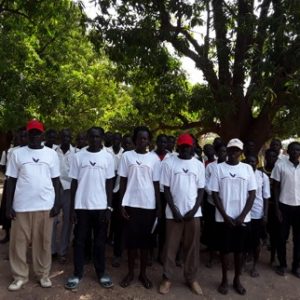By Pat Duggan (Partnership Coordinator) and Santino Yuot (Advisor)
November, 2018
indigo foundation has had a thriving partnership with the Wedweil Community Development Foundation (WCDF) in South Sudan since 2014.
The new Government of South Sudan inherited a country with very little education infrastructure and an acute shortage of qualified teachers and education administrators. The situation is even worse in the war-ravaged and largely-neglected north-west corner of the country (previously called Bahr-El-Gazal) in which WCDF works.
Our partnership with WCDF was in direct response to this difficult situation. Together, we aim to improve basic education opportunities for poor communities, particularly in Wedweil village located in Lol state.
Since the establishment of this partnership, the Wedweil school—destroyed by decades of war—was rebuilt by the community, using indigo foundation funds and advice. School enrolments more than doubled and the State Minister even converted the school into a Secondary school.
Reflecting on these achievements in late 2017, Santino Yuot, our long-time Program Adviser – himself a refugee who fled Wedweil as a young man, and eventually made his home in Sydney – said that “for years, [the Wedweil community] has lived with the broken walls of the old school in their sight and now they look at a beautiful functional building every day. And most importantly, they see their children getting an education”.
Santino also saw that his very new country faces a chronic shortage of trained teachers. Many teachers where WCDF is working are Year 12 school-leavers, who have returned from neighbouring countries since South Sudan’s independence with little more than a strong desire to build South Sudan.
So WCDF is helping government education authorities in Aweil to kickstart teachers’ training during the annual school summer break.
Santino visited Wedweil and Aweil in the first quarter of 2018 and we are delighted to see the partnership’s continuing momentum. Around 60 trainee teachers graduated from the first month of the three-month in-service training course in Aweil in February, well over double the numbers in the trial training held in 2017.
The 60 trainees, from across north-west South Sudan, will hopefully return for the second and third sessions of the course in 2019 and 2020. The delivery of the course reflects a true partnership: WCDF (supported by indigo foundation) provides an allowance to trainers; it also provides logistics support to the Ministry and helps troubleshoot any problems. WDCF also liaises closely with the UN’s World Food Programme to organise food for participants and trainers during the course. The Ministry finds the venue, identifies student teachers and trainers and keeps the course moving. It also arranges the graduation, at which participants received certificates from the Minister for Education; this is very important for them.
Our planned infrastructure improvements to the Wedweil Community Secondary School are also progressing nicely. This year, we hope to complete a fence around the school’s perimeter. The fence will protect the area from animals, so WDCF can help the community create a food garden in the school field. We also repaired the water pump servicing the Wedweil school and community.
Santino is returning to north-western South Sudan again in November this year, to support WCDF to keep the momentum going. The second month of the teachers’ training course, completion of the fence and other infrastructure, and a financial management, planning and community development training for WCDF members are on the agenda.
If there is scope, initial steps will be taken in planning for the school community garden, which could become a central focus for the community in coming years.
While we are very pleased with its progress, we are mindful that there are significant challenges ahead. A key challenge is ensuring women participate and benefit from the activities as much as possible. According to the UN, South Sudan is the worst place in the world for girls to attend school. And only 14% of all teachers in South Sudan are female. So, for this partnership, increasing participation by female teachers in the training is a priority. We hope to triple the numbers of women on the course in 2019, from two participants to six. The establishment of the community food garden at the Wedweil School is also an important opportunity to build women’s participation in the partnership’s activities.
Ultimately, we are working to make a sustained improvement in the lives of poor communities in this remote part of South Sudan. Sustainability depends on community ownership. In this case, that depends on the degree to which the fledgling WCDF becomes a truly viable community organisation that reflects community needs and priorities and helps the community achieve its outcomes.
It’s a long-term undertaking, and a high risk one in a very remote area of a fragile, poor country. But it is a challenge that we are definitely up for.

